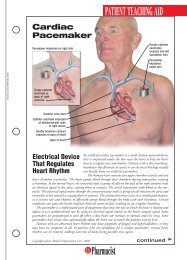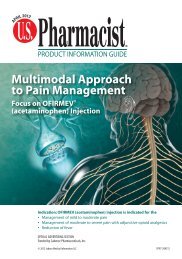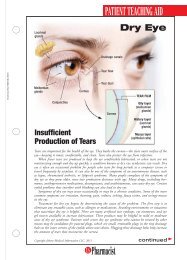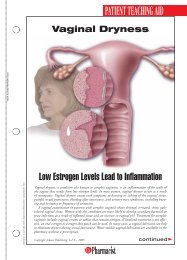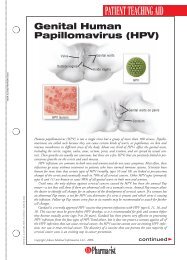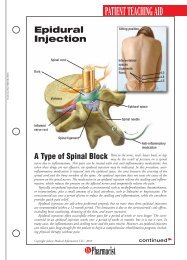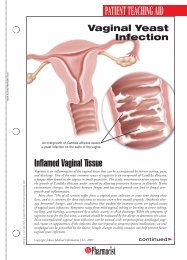ProgressiveSupranuclear PalsyPARKINSON’S-LIKE SYMPTOMSDifficulty looking upwithout extendingthe neck ordifficulty climbingup and down stairsmay signal thiscondition.Progressive supranuclearpalsy (PSP) is an uncommonneurodegenerative disorderoften misdiagnosed, mostfrequently as Parkinson’s disease(PD). 1,2 Although PSP is lesscommon than PD, both are characterizedby progressive loss ofselected neurons in certain areasof the brain, which causes disease.3,4 Approximately 4% ofpatients experiencing parkinsoniansymptoms have PSP. 2 Few cliniciansare proficient at recognizingthe nonclassic presentationsof PSP and also at treating it. 5<strong>Pharmacist</strong>s should be aware ofthis distinct condition with anunknown cause, also known asSteele-Richardson-Olszewski syndrome.Although PSP usuallystrikes individuals after age 50years, some patients can developsigns in their fourth decade. 1,2Mary Ann E. Zagaria, PharmD, MS, CGPSenior Care Consultant <strong>Pharmacist</strong> andPresident of MZ Associates, Inc.Norwich, New Yorkwww.mzassociatesinc.comRecipient of the Excellence in Geriatric PharmacyPractice Award from the Commission forCertification in Geriatric PharmacyDisability develops in PSPpatients within 3 to 5 years ofdiagnosis; death usually occurswithin 10 years of symptomonset, often secondary to infection(e.g., pneumonia) or othercomplications of immobility. 2,6,7Advance directives, such as a livingwill or durable power of attorney(see Reference 8), should beprepared by patients diagnosedwith PSP so that they have theopportunity to indicate the typeof medical treatment they wish toreceive as part of their end-of-lifecare plan. 6,8Pathophysiologyand DiagnosisWhile PD is slowly progressiveand primarily involves the substantianigra, patients with PSPshow a degeneration of neuronsthat occurs in the basal ganglia—the part of the brain that helpscoordinate and ensure smoothbody movements—and in thebrain stem, the part of the brainthat controls vital body functions(e.g., breathing, heart rate, swallowing)and eye movements. 1,6 Inaddition, neurofibrillary tanglesare detected (containing abnormaltau protein), and strokes (lacunar)may occur in the basal gangliaand deep white matter. 1According to Schneider andMandelkow, neurofibrillary tanglesare a hallmark of Alzheimer’sand other neurodegenerative diseases(e.g., PSP, Pick’s disease,frontotemporal dementia, andparkinsonism linked to chromosome17) referred to astauopathies, since neurofibrillarytangles are composed of intracellularaggregates of the microtubule-associatedprotein tau. 9While the mechanisms underlyingtau-mediated neurotoxicity arenot well understood, neurodegenerationand neuronal dysfunctionare associated with pathologichyperphosphorylation and aggregationof tau. 9 A shared characteristicof PD and PSP is the presenceof Lewy bodies (abnormalintracytoplasmic inclusiondeposits), although Lewy bodiesare found in a minority of PSPcases. 3Diagnosis of PSP is clinical, byhistory and physical examination. 2Neuroimaging is not required fordiagnosis since findings are notspecific. 2Signs and SymptomsA core feature of PSP is known asvertical supranuclear gaze palsy,where the voluntary vertical gazeis impaired; this causes difficultylooking up or down withoutextending or flexing the neck, ordifficulty climbing up and downstairs, and may be the first noticeablesymptom of the disease. 1,2Shortly after onset of the disorder,patients present with posturalinstability, causing gait unsteadinessand falls (typically backward).2,3 A staring, astonishedappearance may be caused byretraction of the upper eyelids. 2Other findings (TABLE 1) mayinclude dysphagia and dysarthriawith emotional lability(pseudobulbar palsy). Emotional20U.S. <strong>Pharmacist</strong> • November 2009 • www.uspharmacist.com
PROGRESSIVE SUPRANUCLEAR PALSYlability (with a propensity tolaugh or cry easily) is referred toas pseudobulbar affect. 2 Rigidity,bradykinesia, and dystonic neckextension may be present, andlanguage functions resemble thoseevident in PD (i.e., speech maybecome incomprehensible, repetitive/babbling,or mute). 1-3,7 Whileonly occasional, a subtle restingtremor may be present. 2Deficits, similar to those secondaryto multiple strokes, occurin a progressive and usually rapidfashion. 2 In terms of the patient’scognition, mental slowing, executivedysfunction (i.e., impairmentof volitional activities such asplanning, organizing, self-awareness,self-regulation, and initiationof action), and memoryimpairment (less severe than inAlzheimer’s disease) occur. 1,3,6Later in the disease, depressionand dementia are common, causingsome individuals to experiencesleep disturbances, agitation,and irritability. 2,3 Eventually, mostPSP patients require a wheelchairand a feeding tube. 7Upon initially seeing a patientwith symptoms of PSP, pharmacistsmay recognize symptomsthat resemble drug-inducedpseudoparkinsonism, most commonlyseen with the use of firstgenerationantipsychotic agents ofthe phenothiazine (e.g., chlorpromazine),thioxanthene (e.g., thiothixene),or butyrophenone (e.g.,haloperidol) classes. Based on theparkinsonian signs and symptomsand considering that the coresymptom of vertical supranucleargaze palsy is not always present inthe early stage of PSP, it is notdifficult to understand how thisdisease may be misdiagnosed asPD, especially since diagnosis isdetermined clinically and not byany substantiating diagnostic test.Schmidt et al note the mostimportant features that characterizeand differentiate PSP fromother parkinsonian syndromes asTable 1Potential Symptoms of ProgressiveSupranuclear Palsy• Loss of voluntary eye movements; particular difficulty with vertical movements,referred to as vertical supranuclear gaze palsy; inability to fix gaze on a stationaryor moving object (square wave jerks). Reflexive eye movements are unaffected• Other ophthalmic signs and symptoms include blurred vision, diplopia, photophobia,burning, tearing, and upper eyelid retraction• Postural instability causing falls (specifically a tendency to fall backward)• Bradykinesia• Muscular rigidity with progressive dyskinetic movements due to disorderedtonicity of muscle (e.g., dystonic neck extension); subtle resting tremor(usually absent)• Pseudobulbar palsy: difficulty swallowing (dysphagia) and speech disturbance(dysarthria) with emotional lability• Cognitive impairment (e.g., mental slowing, executive dysfunction, memoryimpairment)• Sleep disturbances (insomnia or hyposomnia)• Agitation, irritability, disinhibition• Depression (late in course)• Dementia (eventually occurs)Source: References 1-3, 6, 7, 16.the following: 1) supranucleargaze palsy; 2) postural instability;3) pseudobulbar palsy; and 4)cognitive disturbances. 10 Litvanet al indicate that which specificallydifferentiates PSP fromother diseases: 1) PSP from PD isunstable gait, absence of tremordominantdisease, and absence ofa response to levodopa; 2) PSPfrom diffuse Lewy body disease issupranuclear vertical gaze palsy,gait instability, and the absenceof delusions; 3) PSP from Pick’sdisease is postural instability; 4)PSP from multiple system atrophyis supranuclear vertical gazepalsy and increased age at symptomonset; and 5) PSP from corticobasaldegeneration is gaitabnormality, severe upward gazepalsy, bilateral bradykinesia, andabsence of alien limbsyndrome. 11Significant autonomic dysfunctionmay be seen in patients withPSP as well as in patients withPD. 10 According to Schmidt et al,the parasympathetic cardiovascularsystem appears to be involved to asimilar extent in patients with PDand patients with PSP, as comparedto sympathetic cardiovasculardysfunction, which is morefrequent and severe in patientswith PD but can also be seen inpatients with PSP. 10TreatmentPSP is an incurable condition.Treatment is supportive and far lesseffective than that for Parkinson’sdisease. 2 The treatment of PSPremains unsatisfactory, since onlyoccasionally do levodopa,dopamine agonists (TABLE 2),amantadine, or amitriptyline partiallyrelieve rigidity. 1,2 It is presumedthat the reason PSP is notresponsive to dopamine replacementor dopamine agonist therapiesis that dopamine receptorsare decreased as a result of postsynapticdamage beyond pathologicalchanges seen in PD. 12 Symptomatictreatment with drugs andother therapies should be targetedat reducing morbidity andimproving quality of life (e.g.,depression can be treated with21U.S. <strong>Pharmacist</strong> • November 2009 • www.uspharmacist.com



